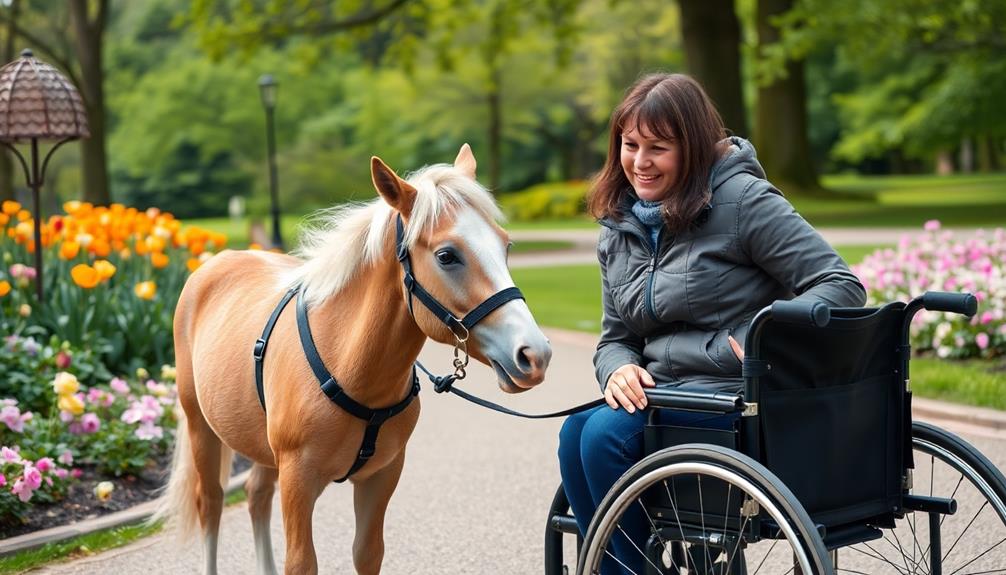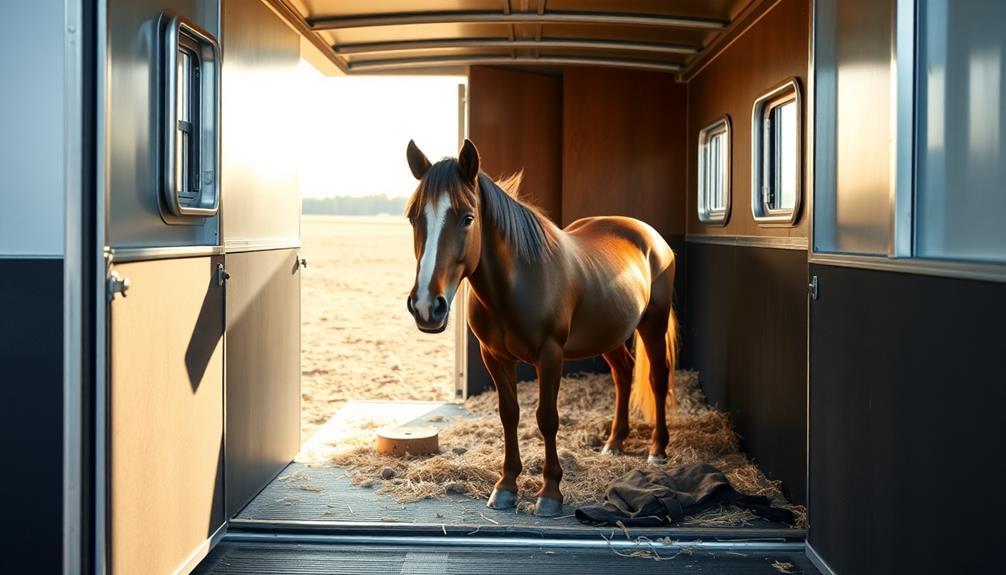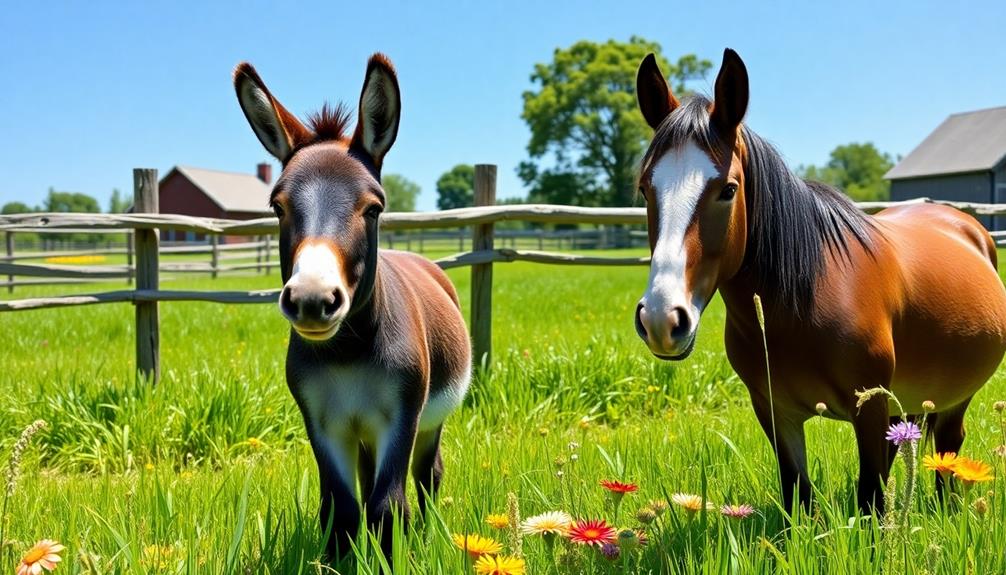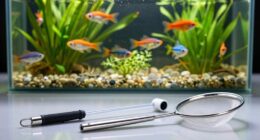Miniature horse carts are the perfect way to enjoy time with your mini companion while exploring the outdoors. They come in two-wheel and four-wheel designs, allowing you to choose the best fit for your horse's experience level. Look for carts that prioritize comfort and stability, with adjustable seats and quality suspension systems. Remember to select the right size to guarantee a safe ride. Whether you're carting for exercise or competitive events, these carts make your outings enjoyable and memorable. Curious about how to choose the best cart and guarantee a safe experience? There's more to discover on this journey!
Key Takeaways
- Miniature horse carts come in two-wheel and four-wheel designs, with four-wheel carts offering better stability for inexperienced ponies.
- Choose the right cart size based on shaft length, ensuring it matches your miniature horse's height for comfort and safety.
- Quality carts feature a half elliptic suspension system for smooth rides, adjustable seats, and safety elements like sturdy footman's loops.
- Regular maintenance, including inspections and cleanings, is crucial for the longevity and safety of your cart and harness.
- Carts provide a unique way to bond with your horse while offering exercise and opportunities for outdoor activities and competitive driving.
Understanding Miniature Horse Carts

When considering a miniature horse cart, it's essential to understand their unique designs and functionalities. Miniature horse carts come in two configurations: two-wheel and four-wheel. If you're looking for stability, the four-wheel cart is your best bet, offering a smoother ride and better weight distribution for your pony.
On the other hand, two-wheel carts are lighter, making them easier to maneuver, though they can be less stable.
Many carts feature adjustable seat positions, enhancing comfort for both you and your pony. This is especially important during recreational driving, where comfort can impact your experience.
If you opt for an easy entry cart, loading and unloading your miniature horse becomes a breeze, allowing you to focus on enjoying your time together.
When choosing a cart, pay attention to its design elements, such as wheel size and suspension, as these can greatly affect the ride quality.
For varied activities, including training and shows, understanding these features guarantees you make the most of your miniature horse cart experience.
Choosing the Right Cart Size

Selecting the right cart size for your miniature horse is essential for guaranteeing a safe and enjoyable experience. A cart that's too big or too small can lead to balance issues and discomfort for your pony.
To make the best choice, keep the following points in mind:
- Shaft Length: Match the shaft length to your pony's size. Miniatures under 3 feet need a 49-55 inch shaft, while regular ponies require a 60-inch shaft.
- Weight Distribution: Ensure the cart's weight is evenly distributed to maintain stability, especially in two-wheel configurations.
- Stability: Consider opting for a four-wheel cart if your miniature horse is still gaining confidence, as it offers better stability.
- Cart Size: Choose a cart specifically designed for miniature horses to enhance their comfort and security during rides.
- Avoid Overloading: Don't attach full-sized horses to pony carts, as this can cause strain and safety hazards.
Features of Quality Carts

A quality miniature horse cart should prioritize comfort, safety, and functionality for both the horse and driver. One key feature is the half elliptic suspension system, which guarantees a smooth ride, minimizing jostling for both you and your mini.
When selecting a cart, look for adjustable seat positions that allow you to customize your seating for maximum balance and comfort during different driving scenarios.
Wheels play an important role too; lightweight designs, ideally weighing between 75 to 125 lbs, make handling and transport easy. Consider carts with wooden or wooden-looking wheels for both sturdiness and aesthetic appeal, perfect for pasture use.
Safety features can't be overlooked—sturdy footman's loops for attaching breeching holdback straps and well-constructed shafts that return to their original shape are vital for secure driving experiences.
Lastly, an easy entry design makes getting in and out of the cart hassle-free, guaranteeing you can enjoy every ride without unnecessary struggle.
With these features in mind, you can choose a miniature horse cart that enhances your driving experience while prioritizing the well-being of your horse.
Customization and Design Options

When customizing your miniature horse cart, you'll want to contemplate the various wheel material choices available to suit your driving style and terrain.
Additionally, seat comfort features can greatly enhance your experience, so think about options that provide the best support for long rides.
With these choices, you can create a cart that truly fits your needs and preferences.
Wheel Material Choices
Choosing the right wheel material for your miniature horse cart can greatly enhance your driving experience.
You'll typically have two main options: solid rubber and pneumatic tires. Solid rubber wheels are durable and low-maintenance, but they can result in a harder ride quality. On the other hand, pneumatic tires offer a smoother experience, especially on uneven terrain. However, they require inflation and are susceptible to punctures.
When deciding, consider the following:
- Wheel Sizes: Larger wheels generally provide better ride quality over bumps.
- Solid Rubber: Great for durability but may compromise comfort.
- Pneumatic Tires: Guarantee a softer ride but need regular maintenance.
- Terrain: Match your wheel choice to the type of surfaces you'll be driving on.
- Customization Options: Anti-puncture strips and special fluids can enhance pneumatic tire durability.
Ultimately, the choice of wheel size and material should align with your intended use, guaranteeing both comfort for you and your mini horse as you enjoy your rides together!
Seat Comfort Features
Enhancing your driving experience with the right seat comfort features can make all the difference during longer rides with your miniature horse. Many miniature horse carts come equipped with adjustable seats, allowing you to customize the height and position for ideal comfort and balance. This guarantees you can enjoy your time on the road without unnecessary strain.
To further enhance comfort, look for carts that feature thicker seat padding, which provides extra support during extended drives. You can choose from various materials, such as black vinyl or patent leather, to match your style while keeping comfort in mind.
Consider models like the Mini Meadowbrook Cart Model #05, which includes a fold-down backrest for added relaxation. You'll appreciate the customizable armrests and seat sliders available on certain carts, giving you the flexibility to find your perfect driving position.
These thoughtful seat comfort features not only improve your overall experience but also contribute to a smoother ride, especially when traversing uneven terrain.
Enjoy the journey with your miniature horse by investing in a cart that prioritizes your comfort.
Pricing and Budget Considerations

Maneuvering the world of miniature horse carts involves understanding the pricing landscape and planning your budget effectively. The costs can vary considerably, so it's crucial to take into account not just the initial purchase price but also other budget considerations.
Miniature horse carts can range from around $650 for small custom options to over $3,000 for deluxe models.
Here are some factors to keep in mind:
- Initial purchase price: Expect to pay between $650 and $3,195 for quality options.
- Customization costs: Personalized features can add to your budget.
- Maintenance: Regular upkeep is necessary for safety and longevity.
- Accessories: Don't forget to factor in the cost of harnesses and other essentials.
- Competitive pricing: Look for economical models like the Model #05 starting at $1,395.
Best Practices for Safe Driving

When it comes to driving a miniature horse cart, prioritizing safety is vital for both you and your horse. Start by confirming your cart is well-balanced, utilizing a half elliptic suspension system to enhance ride quality and stability.
Regularly inspect the cart's welds for size, smoothness, and connection quality to maintain structural integrity.
Use shafts that are appropriately sized and designed to bend slightly away from the horse to prevent entanglement, which is essential for safe driving.
Choose wheels that are suited for the terrain you'll be traversing; larger wheels improve ride quality over bumps, while solid rubber tires offer durability on rough terrains.
Pay close attention to your harnessing techniques. Verify all components are in good condition, as this facilitates safe and effective driving practices.
Before each ride, double-check that everything is secure and functioning properly.
Frequently Asked Questions
What Size Cart for My Mini Horse?
To choose the right cart for your mini horse, measure its height. For those between 28-34 inches, opt for shafts around 49-55 inches. Guarantee the cart's lightweight and well-balanced for safe, comfortable driving.
How Much Is a Mini Mini Horse?
You'd be surprised how much a mini mini horse can cost! Prices usually range from $500 to $3,000, but high-quality ones with show potential might go for $5,000 or even more. Keep your budget in mind!
How Much Weight Can a Mini Horse Pull in a Cart?
A miniature horse can pull between 15% to 30% of its body weight in a cart. For example, a 300-pound mini can safely manage 45 to 90 pounds, depending on its fitness and terrain conditions.
Is There a Difference Between a Mini Horse and a Mini Pony?
Yes, there's a difference! Mini horses stand 34 inches or shorter and resemble full-sized horses, while mini ponies can be taller, have stockier builds, and were bred for work. Both have unique traits and purposes.
Conclusion
In the enchanting world of miniature horse carts, you've opened a delightful adventure for you and your mini companion. With the right cart, you're not just riding; you're weaving memories under the sun, like a painter with a vibrant palette. As you steer through meadows, remember to embrace safety and let your creativity shine in customization. So, buckle up, enjoy the ride, and let the magic of the journey unfold with every trot and turn!









